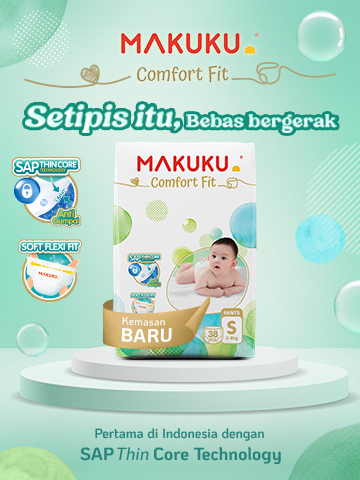
It is normal for babies to cry. However, what if your little one cries for a long time, even for hours on end? Many moms feel panicked, even though they have tried breastfeeding, changing diapers, and carrying their babies. This condition may be a sign of colic, a common condition often experienced by newborns up to around 3–4 months of age. Although not dangerous, colic often leaves moms feeling overwhelmed. Therefore, it is important to recognize the causes, symptoms, and appropriate ways to address it.
What is Colic in Babies?
Colic is a condition where a baby cries excessively without a clear reason, usually for more than 3 hours a day, occurring more than 3 days a week, and lasting for at least 3 consecutive weeks. Crying due to colic is generally difficult to soothe even though the baby's needs, such as feeding or diaper changes, have been met.
This condition most often appears when the baby is 2–3 weeks old and can last until the baby is 3–4 months old. Although it sounds concerning, Moms do not need to worry excessively because colic is not a sign of a serious illness.
Causes of Colic in Babies
Until now, the exact cause of colic is unknown. However, there are several factors suspected to trigger it, including:
- Immature digestive system: Newborns still have sensitive digestive systems, making them prone to flatulence or discomfort.
- Allergy or intolerance to milk: Some babies may be sensitive to cow's milk protein or lactose, causing stomach discomfort.
- Air swallowed while breastfeeding: Babies can swallow excess air while breastfeeding, especially if the breastfeeding position is not correct. This causes bloating and makes the baby fussy.
- Emotional factors: Babies may also cry more often if they feel stressed, tired, or overstimulated by their surroundings.
Symptoms of Colic in Babies
Moms can recognize colic through the following signs:
-
Crying lasts more than 3 hours a day and often occurs in the afternoon or evening.
-
The baby seems difficult to soothe even though they have been held or breastfed.
-
The baby's face appears red, hands clenched, or body arched backward when crying.
-
The baby's stomach feels tight or bloated.
-
Babies often lift their legs towards their stomach when crying.
These symptoms usually appear repeatedly and regularly every day.
Causes of Colic in Babies
Until now, the exact cause of colic is unknown. However, there are several factors suspected to trigger it, including:
- Babies' digestive systems are not yet fully developed, making them more sensitive to gas and certain foods.
- Excess gas production in the baby's stomach, which can cause discomfort.
- Allergies or intolerance to cow's milk protein in babies who consume formula milk.
- Excessive stimulation, such as loud noises or bright lights, which can make babies more fussy.
- Changes in the mother's mood, as babies are highly sensitive to stress or anxiety felt by their parents.
Symptoms of Colic in Babies
Some signs that usually appear when a baby experiences colic include:
-
Crying loudly without a clear reason, especially in the afternoon or evening.
-
Pulling the legs towards the stomach or clenching the fists while crying.
-
The baby's face appears reddish or tense.
-
The stomach feels bloated or makes noises due to excess gas.
-
The baby seems difficult to soothe even though they have been held or breastfed.
If Moms repeatedly notice these signs, there is a possibility that the little one is experiencing colic.
How to Overcome Colic in Babies
Facing a colicky baby can indeed overwhelm Moms. However, there are some simple ways that can help soothe the little one, including:
1. Carry in an upright position
Carrying a baby in an upright position can help reduce gas pressure in their stomach. Moms can also gently pat their back to help release air.
2. Give a gentle massage to the abdomen
Massage the baby's stomach with circular motions in a clockwise direction using the palm of your hand. This method can help reduce bloating while also making the baby more relaxed.
3. Use the tummy time technique
Placing the baby on their stomach on Moms' lap while gently rubbing their back can help reduce discomfort caused by excess gas.
4. Create a calm atmosphere
Dim the lights, reduce noise, or turn on white noise such as the sound of a fan or dryer. A quiet environment can make babies more comfortable.
5. Bathe with warm water
Warm water can help relax a baby's muscles and soothe an uncomfortable stomach.
6. Pay attention to the baby's eating pattern
If the baby consumes formula milk, consult with a doctor about whether it's necessary to change the type of milk. For breastfeeding moms, try to pay attention to the foods consumed because some foods (such as caffeine or spicy foods) can trigger colic.
7. Hugging using the swaddling method
Swaddling a baby with a soft cloth can provide a sense of security, similar to being in the womb.
8. Take breaks while breastfeeding
Pause briefly while breastfeeding to burp the baby. This helps reduce the air entering the stomach.
9. Stay calm and patient
Colic indeed makes Moms feel anxious or tired. However, keeping emotions stable is very important because babies can sense Moms' energy. Take a break if necessary, for example by asking for help from a partner or family.
When Should You Take Your Baby to the Doctor?
Although colic usually improves on its own, Moms should immediately consult a doctor if:
-
The baby cried continuously, making it difficult to soothe at all.
-
Crying accompanied by repeated vomiting, fever, diarrhea, or bloody stools.
-
The baby's weight does not increase according to age.
-
The baby appears very weak or does not want to breastfeed.
The doctor will conduct further examinations to determine whether the baby's crying is truly due to colic or if there is another medical condition that needs to be addressed.
Colic in babies can indeed overwhelm Moms, especially when the crying lasts for a long time without stopping. However, this condition is generally not dangerous and will subside as the baby grows older. By understanding the causes, symptoms, and ways to handle colic, Moms can be more at ease in dealing with the little one. If the baby's crying seems unusual or is accompanied by other symptoms, do not hesitate to take the little one to the doctor for proper treatment.







